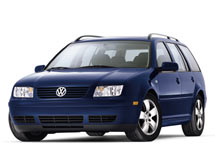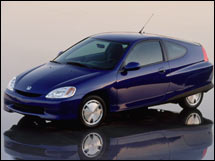NEW YORK (CNN/Money) -
The words "hybrid automobile" conjure images of a squeaky-clean, environmentally friendly future. Contrast that with "diesel," which makes people think of smelly, soot-belching trucks and buses.
You might be surprised to know that diesel-powered cars are seen by automakers and even some environmentalists as just as promising for the environment as those oh-so-fashionable hybrids.
 |
|
| Volkswagen Jetta TDI Diesel |
That promise stems from diesel's proven ability to deliver 20 to 40 percent better fuel economy than gasoline-powered engines. Lifting the fuel economy of America's fleet is the surest path to cutting greenhouse gas emissions like carbon dioxide, which many scientists link to global warming and its pernicious effects on the world's climate.
And with light trucks (SUVs, pickups and minivans) dragging the nation's fuel economy to its lowest point in two decades, an impatient government appears ready to demand better performance from those light trucks. They currently must achieve an average just 20.7 mpg, compared with 27.5 mpg for passenger cars.
Those twin missions -- boosting fuel economy and cutting greenhouse gases -- are tailor-made for the diesel. But only if it overcomes some technical and regulatory hurdles. That, and a nation of skeptical consumers who still remember the notoriously loud, smoky, claptrap diesel engines of the '70s and '80s.
 |
|
| Honda Insight Hybrid |
Hybrids, which combine one or more electric motors with an efficient gasoline engine, promise another way to cut pollution drastically from cars. Ford's hybrid version of its Escape SUV is expected to achieve 35-40 mpg in city driving when it goes on sale to consumers next year. But hybrid technology is expensive and it's not yet clear that automakers can drive costs low enough and sales high enough to make them profitable. Fuel-cell vehicles, powered by hydrogen, are even cleaner, but the technology remains years or decades away from most consumers.
Diesel technology, in contrast, has been around for more than a century. Paris-born Bavarian Dr. Rudolf Diesel patented his first diesel engine in 1893. They work by injecting highly pressurized fuel into cylinders where air has been extremely compressed. Because that ultra-hot air ignites the fuel on contact, no spark plugs are required.
Hybrids, on the other hand haven't been around long enough to establish a track record for long-term durability. This is especially true for their batteries. Honda and Toyota say their battery packs are designed for the life of the vehicle, but the batteries do degrade over time, and they currently cost several thousand dollars to replace.
A new animal
While Ford, GM and Chrysler all are developing gas-electric hybrids, engineers also are studying the possibility of expanding their diesel offerings.
"What we call the modern diesel is a lot different from what most consumers know about," said Dick Baker, a Ford research engineer for diesel programs. "We think the North American public would really like diesel vehicles if they experienced them."
| 
| |

| 
| 
|

|
 Environmentalists are using Earth Day as a platform to push their vision of a more energy-efficient future. Robert F. Kennedy Jr., senior attorney at Natural Resources Defense Council, talks about U.S. dependency on imported oil. Environmentalists are using Earth Day as a platform to push their vision of a more energy-efficient future. Robert F. Kennedy Jr., senior attorney at Natural Resources Defense Council, talks about U.S. dependency on imported oil.
|
|
Play video
(QuickTime, Real or Windows Media)
|
| 
|

|
|
European consumers already have embraced diesels, which have soared in popularity to capture about 40 percent of the European market. The engines cost more, but the initial expense is easily offset by improved economy, cheaper diesel fuel and durability that gas engines can't match. Blessed with strong torque -- the pulling power you feel when you punch the gas -- modern turbocharged diesels deliver especially good highway acceleration, and can offer a 500-700 mile range on a single tank.
In the U.S., diesels have been relegated largely to heavy-duty pickup buyers. Among passenger cars, they accounted for only 31,220 sales last year. But consumers soon will see more choices:
- Chrysler, which already exports diesel-powered Jeep Libertys and PT Cruisers to Europe, plans to sell about 5,000 diesel Liberty SUVs here in 2004. The Liberty can deliver average fuel economy of about 25 mpg, compared with just 17 mpg for the gasoline version.
- Mercedes-Benz, which abandoned U.S. diesels in 1999, plans a comeback late this year with optional diesels on the 2004 E-Class sedan that can achieve roughly 30 mpg.
- Volkswagen will expand its lineup with a diesel option on its new Touareg SUV for 2004.
- Ford is considering selling a diesel version of its popular Focus compact.
Gas-hogging SUVs could be especially suited to diesels, which offer strong acceleration and towing power while boosting economy. SUVs and pickups that deliver around 15 mpg could surpass 20 mpg with a simple switch to diesel.
Hurdles still to be cleared
While diesels produce less carbon dioxide and carbon monoxide than gasoline engines, they've historically pumped out more smog-causing nitrogen oxides and particulates, which basically means soot. The still unanswered question is whether diesels can meet stringent anti-smog regulations that will require them to match the emissions performance of gasoline vehicles by 2007.
Engineers are designing special traps to capture particulates, and catalysts that can break nitrogen oxides into harmless substances. But to work effectively, the so-called "clean diesel" technology requires fuel with far less sulfur than the typically 350-parts-per-million variety sold today.
That's finally going to happen, with regulations that give the oil industry until 2006 to reduce diesel sulfur levels to just 15 parts per million.
Mercedes is confident that, when low-sulfur fuel becomes widely available around 2007, its new-generation, turbocharged diesel will meet toughened emissions standards in all 50 states. The challenge may be greater for lower-cost cars, Ford's Baker adds.
This story was originally published on February 28, 2003.
Lawrence Ulrich writes about cars for Money Magazine. You can contact him at autos@money.com.

|

